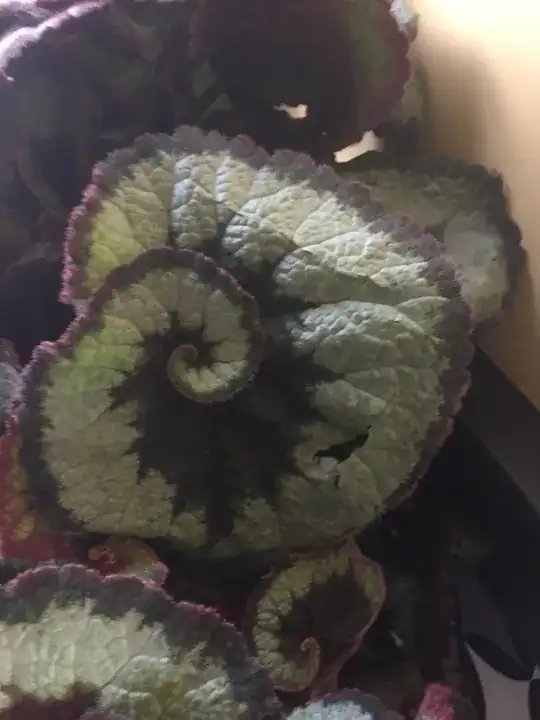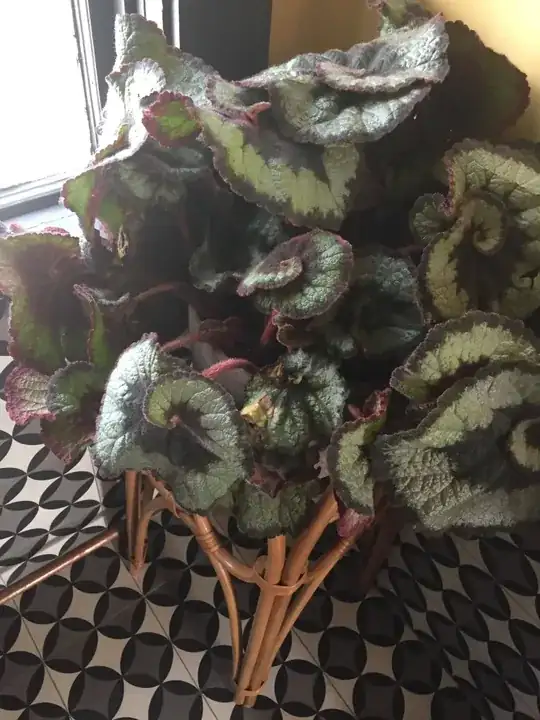I saw this Begonia in a restaurant in Provincetown, Massachusetts, and was very impressed by it. What is it exactly? Is it hard to grow?
2 Answers
It's a Begonia rex variety, specifically, 'Escargot'. Prefers part shade, shouldn't be kept overly wet, but also should not be allowed to dry out and wilt, so checking the surface of the potting soil is necessary - water when it feels just dry to the touch, empty out any tray or outer pot 30 minutes later. Other than removing any withered or dying leaves, it's relatively easy care, more info can be found here: Begonia 'Escargot'. I can't advise where you can find one though, I don't live in the same country as you do.
- 131,823
- 3
- 72
- 162
-
1Just a note on growing the more ornamental begonias. They have a tendency to develop mildew or fungus on their leaves if the air is very still and humid. Perhaps it was just the conditions in my home but I found that while humidity is important, so is air movement. I don't mean a breeze but not still air. I can grow just about anything with no problems but the ornamental Rex begonias were a pain requiring too much fussing. – Jude Aug 06 '17 at 00:09
I agree with Bamboo that what you have is an Escargot, in the rex begonia family. I have grown begonias in Boston and Central Massachusetts for years, so I know you can do it if you want.
The begonias in the rex variety aren't cold hardy at all, especially in Massachusetts. They can only handle temperatures down to about 60°F (15°C). Therefore, if you keep it as a garden plant, make sure to transplant to a pot and bring it in when the weather gets cool. I usually just put the pot outside for the warmer months. We've had so much unanticipated cold weather this summer that I've just kept my begonias inside.
When outside, it prefers a shady spot, or an area of dappled sunlight. Inside is the same. A partly sunny window is great.
It likes at least 50% humidity, but the leaves may wilt or discolor if watered from above, so setting it in a tray and watering from underneath can be more successful. To know when to water, the finger in the soil test is very reliable. If it feels dry to the touch, give it some water. Also, if the edges of the leaves become brittle, that can be a sign that it needs a drink. Excellent drainage is very important though, as it doesn't like to sit in water for any length of time.
Some of the care sheets from experienced growers, such as this call it a finicky plant especially because of its susceptibility to mildew if the humidity levels aren't right. @Jude, in the comment below Bamboo's answer, warned of that because of specific experience, so I'd give it some thought. Others say that the Escargot itself has been bred to be less susceptible to those things. It seems to be all about the proper airflow.
If begonias intrigue you, I found a few sites you might want to check out.
My favorite is the Buxton Branch of the American Begonia Society. It's a horticultural, non-profit society devoted to Begonia plants of all kinds, including the escargot and other rex varieties. It's based in Massachusetts, so the large wealth of information is tailored to growers here and in the rest of New England. It has a gallery of Begonia of the Month, including some like yours. There's a section devoted to where you can see them in Massachusetts, including arboretums, public gardens and botanical gardens, many of which I've been to. There's also a link to places to purchase them.
The Western Massachusetts Gardening Association has good information and offers a lovely book called All About Begonias.
In case you're interested in propagation, this site is all about the different ways to propagate begonias. Apparently it's easily done by a leaf. I haven't tried it though, so I can't speak from experience.
As for where to get them, there are some nurseries around the state, and others online. We're technically not supposed to recommend specific stores, but some of these care pages are from nurseries that sell them, and, as I said, the Buxton Begonia Society above can connect you. Mine have come from one of the vendors listed there, even though I had never heard of the Society before doing research to write this answer!
I've seen some rex varieties, not necessarily this particular one, in the large home improvement stores, but haven't purchased any, as I'm not sure they get the care they deserve. I can be wrong, though, so if you have a place like that near where you live, you can check it out. Other begonias are more plentiful in those stores.
If you have pets, the ASPCA lists begonias as toxic to cats, dogs and horses. I don't know how much they'd have to eat, or the recommended level of concern. I have to keep all my houseplants on high shelves because of my cats, but I thought I'd mention it in case you want to do further research.
More information about this type of begonia:
Guide to Houseplants
Rex Begonias
Royal Horticultural Society
Begonia Escargot
How to Care for an Escargot Begonia
Growing Rex Begonia Cultorum Group
Nurseries Online
- 6,215
- 8
- 39
- 74

